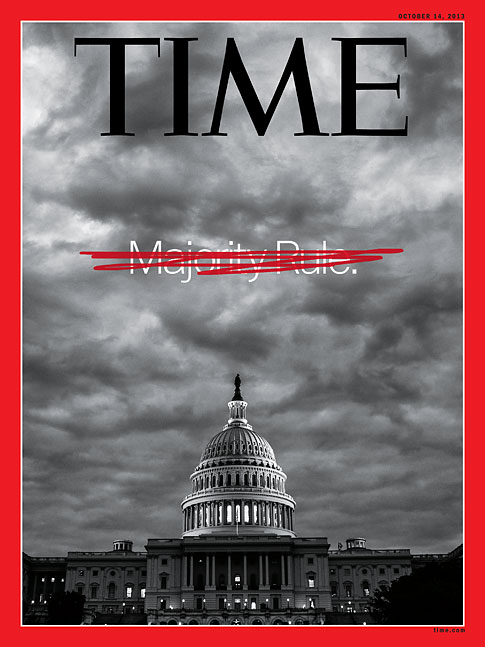
In the 11th hour of any crisis, let alone one that shuts down the world's most powerful government, things are bound to get a little weird. So it was no surprise when members of Congress began showing up for votes in late September reeking of booze. Mickey Hart, a former drummer for the Grateful Dead, appeared mysteriously in a first-floor hallway of the Capitol, uttering a psychedelic koan: "It's the rhythm, stupid." Representative Devin Nunes, a California Republican, compared members of his own party to "lemmings with suicide vests," since jumping off a cliff is no longer enough in Washington. "It's very hard from a distance to figure out who has lost their minds," observed Senator Claire McCaskill, a Missouri Democrat.
Or what else has been lost. For a generation, at the expense of billions of dollars and armies of brilliant minds, America's political parties have cunningly divided most of the country into ideological preserves. It serves their purposes: after multiple rounds of ornate gerrymandering, of the 435 seats in the House of Representatives, fewer than 1 in 5 is truly competitive on Election Day. Republicans speak to Republicans, Democrats to Democrats, the hard right and hard left comfortably cushioned from any obligation to reach out to anyone--leaving the rest of the country with no one to speak to them, or for them.
So when the embattled Speaker of the House John Boehner took to the floor with the clock ticking toward zero and pitched a doomed offer to delay the government shutdown by a few more weeks, his simple mantra drilled to the heart of the problem. "Let's listen to our constituents," Boehner thundered, as though a great chorus of voters had demanded that Obamacare be blocked, no matter the cost to the country.
Let's listen to our constituents. Those words could be etched in the Capitol marble, but perhaps never before in the nation's history have they contained so much complexity. Polls have been clear for weeks that the majority of Americans have no interest in flirting with financial disaster. Depending on how the question was asked, 60% to 70% have opposed shutting down government operations in a vague attempt to dismantle the machinery of Obamacare. Even among Republicans, support for the tactic has hovered around 50%.
But Boehner wasn't speaking for the popular will, at least not in a broad sense. He spoke the battle cry of an angry minority, still steaming from the bank bailouts and still appalled by the massive new health care entitlement about to take effect. Though he might be a pragmatic pol at heart, as party leader Boehner serves 231 other Republican members of Congress, who won a majority of House seats in 2012 despite winning 1.3 million fewer votes than their Democratic peers. Overwhelmingly, these Republicans live in districts drawn to exclude the voices of liberals and independents in favor of the Republican base.
